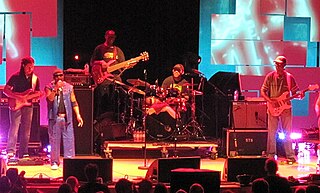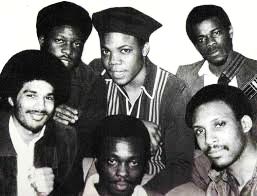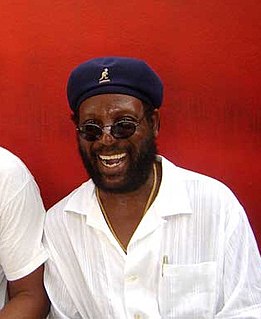
Reggae is a music genre that originated in Jamaica in the late 1960s. The term also denotes the modern popular music of Jamaica and its diaspora. A 1968 single by Toots and the Maytals, "Do the Reggay" was the first popular song to use the word "reggae", effectively naming the genre and introducing it to a global audience. While sometimes used in a broad sense to refer to most types of popular Jamaican dance music, the term reggae more properly denotes a particular music style that was strongly influenced by traditional mento as well as American jazz and rhythm and blues, and evolved out of the earlier genres ska and rocksteady. Reggae usually relates news, social gossip, and political commentary. It is instantly recognizable from the counterpoint between the bass and drum downbeat and the offbeat rhythm section. The immediate origins of reggae were in ska and rocksteady; from the latter, reggae took over the use of the bass as a percussion instrument.

Culture Club are an English pop band formed in London in 1981. The band comprises Boy George, Roy Hay, Mikey Craig and formerly included Jon Moss. Emerging in the New Romantic scene, they are considered one of the most representative and influential groups of the 1980s.

Sean Paul Ryan Francis Henriques OD is a Jamaican dancehall pop recording artist who is regarded as one of the genre's most prolific artists.

The Maytals, known from 1972 to 2020 as Toots and the Maytals, are a Jamaican musical group, one of the best known ska and rocksteady vocal groups. The Maytals were formed in the early 1960s and were key figures in popularizing reggae music.
Steel Pulse are a roots reggae band from the Handsworth area of Birmingham, England. They originally formed at Handsworth Wood Boys School, and were composed of David Hinds, Basil Gabbidon, and Ronald McQueen (bass); along with Basil's brother Colin briefly on drums and Mykaell Riley. Steel Pulse were the first non-Jamaican act to win the Grammy Award for Best Reggae Album.

Stephen Robert Nesta Marley is a Jamaican-American musician and is the son of Bob Marley. Marley is an eight-time Grammy Award winner, three times as a solo artist, twice as a producer of younger brother Damian Marley's Halfway Tree and Welcome to Jamrock albums, and a further three times as a member of his older brother Ziggy Marley's group Ziggy Marley & The Melody Makers.
Morgan Heritage is a Grammy-winning Jamaican reggae band formed in 1994 by five children of reggae artist Denroy Morgan, namely Peter "Peetah" Morgan, Una Morgan, Roy "Gramps" Morgan, Nakhamyah "Lukes" Morgan, and Memmalatel "Mr. Mojo" Morgan. They have toured internationally and released a number of reggae albums.

SOJA is an American Grammy-award winning reggae band based in Arlington, Virginia. Formed in 1997, their music is currently produced under ATO Records. The eight-member band has released a number of singles, albums, and DVDs, including SOJA – Live in Hawaii. Their third full-length album Born in Babylon peaked at #11 on the Top Heatseekers chart, while their 2012 album Strength to Survive topped the Billboard Reggae Album Chart. The band continues to tour and record new music.

Caught You is the third album by the reggae band Steel Pulse, released in 1980. It was released in the United States as Reggae Fever. Caught You was the band's final album for Island Records.
Uzziah "Sticky" Thompson was a Jamaican percussionist, vocalist and deejay active from the late 1950s. He worked with some of the best known performers of Jamaican music and played on hundreds of albums.

True Democracy is an album by the reggae band Steel Pulse, released in 1982.

Rage and Fury is an album by the reggae band Steel Pulse, released in 1997.

Robert Nesta Marley was a Jamaican singer, musician, and songwriter. Considered one of the pioneers of reggae, his musical career was marked by fusing elements of reggae, ska, and rocksteady, as well as his distinctive vocal and songwriting style. Marley's contributions to music increased the visibility of Jamaican music worldwide, and made him a global figure in popular culture to this day. Over the course of his career, Marley became known as a Rastafari icon, and he infused his music with a sense of spirituality. He is also considered a global symbol of Jamaican music and culture and identity, and was controversial in his outspoken support for democratic social reforms. In 1976, Marley survived an assassination attempt in his home, which was thought to be politically motivated. He also supported legalization of marijuana, and advocated for Pan-Africanism.
The Twinkle Brothers are a Jamaican reggae band formed in 1962, and still active in the 21st century under Norman Grant's lead.
Reggae fusion is a genre of reggae that mixes reggae and/or dancehall with other genres, such as pop, rock, hip hop, R&B, jazz, funk, soul, disco, electronic and latin.
Reggae is a music genre that originated in Jamaica in the late 1960s. Australia has several bands and sound systems that play reggae music in a style faithful to its expression in Jamaica. Australia has a relatively small Jamaican community, but reggae penetrated local consciousness via the popularity of reggae among the non-Jamaican population of England in the 1960s and 1970s. Many indigenous musicians have embraced reggae, both for its musical qualities and its ethos of resistance. Examples include Mantaka, No Fixed Address, Zennith and Coloured Stone.

Beshara were a British reggae band from Moseley and Washwood Heath, Birmingham, that formed in 1976. The band are most notable for their 1981 lovers rock hit "Men Cry Too", which reached number 2 in the British reggae charts. Although known for their lovers rock singles, they were also very capable of recording roots reggae. This can be heard in the hymnal recording, "Glory Glory".

William Alexander Anthony "Bunny Rugs" Clark, OD, also known as Bunny Scott, was the lead singer of Jamaican reggae band Third World as well as a solo artist. He began his career in the mid-1960s and was also at one time a member of Inner Circle and half of the duo Bunny & Ricky.

Damini Ebunoluwa Ogulu, known professionally as Burna Boy, is a Nigerian singer, songwriter, and record producer. He rose to stardom in 2012 after releasing "Like to Party", the lead single from his debut studio album, L.I.F.E (2013). In 2017, Burna Boy signed with Bad Habit/Atlantic Records in the United States and Warner Music Group internationally. His third studio album, Outside, marked his major-label debut.
Unity is an album by the American band Big Mountain, released in 1994.













